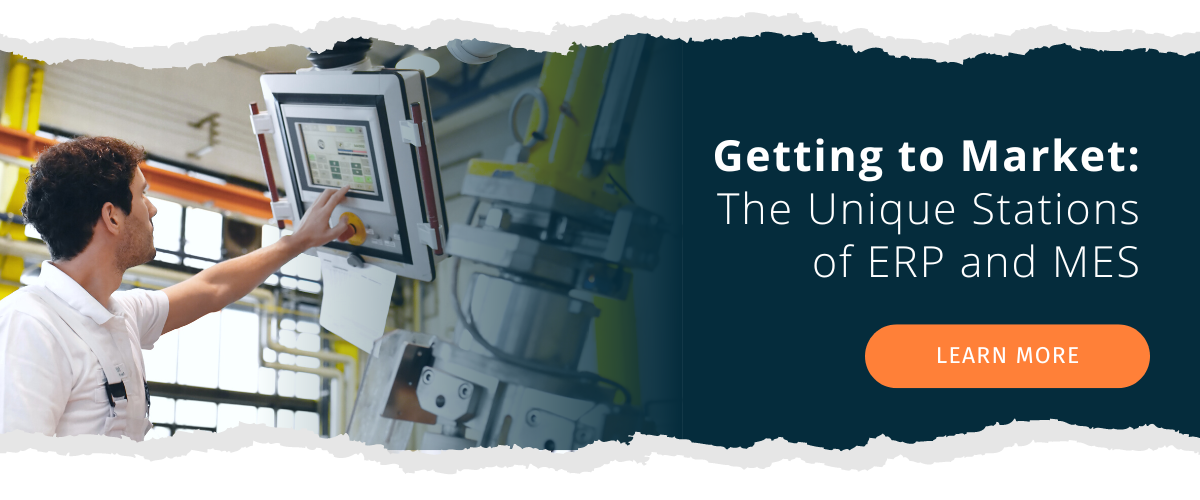10 Key Differences Between ERP and MES Systems
Enterprise Resource Planning (ERP) and Manufacturing Execution Systems (MES) share some common...

Businesses are currently leveraging the power of modern technology to achieve viability in the highly competitive manufacturing arena. Executives, managers and shop floor machine operators are all seeking ways to meet the challenge of concurrently increasing output, reducing costs and keeping quality high.
One recent study revealed that at least 83% of manufacturers have either implemented or are investigating the new breed of smart manufacturing systems.
When you hear the term "manufacturing execution system," what comes to mind? If you're like most people, you might not have a clue what that is. And that's okay! Most people don't know exactly what a MES is, but we're here to help change that.
Let's dive into exactly what a MES is and how it can benefit your business.

A Manufacturing Execution System (MES) is a software application that connects, monitors and controls complex manufacturing systems and data. An MES provides visibility into the key performance indicators (KPIs) of manufacturing operations to allow businesses to make informed decisions that improve overall efficiency.
MES solutions are designed to manage all aspects of the production process, from raw materials to finished products. By integrating with existing enterprise resource planning (ERP) and manufacturing execution systems (MES), businesses can gain real-time visibility into every stage of the production process. This allows businesses to optimize their operations by reducing waste, increasing throughput, and improving quality control.
Manufacturing Execution Systems (MES) help businesses reach the goal of more efficient operational decision-making by processing the flood of information required to utilize production capacity fully and minimize errors. MES interprets the data it collects from electronic process control systems, makes adjustments to optimize operations in real time and shares detailed results in human form through advanced reporting capabilities.
The benefits of an MES are many, but the most important benefits can be summarized into four main categories:
An MES can provide significant improvements in all of these areas, but the specific benefits will vary depending on the particular needs of the business.
One of the most important benefits of an MES is the increased visibility and control it can provide over manufacturing operations. By integrating with existing systems and data, an MES can provide real-time visibility into every stage of the production process. This allows businesses to identify bottlenecks, optimize resources and make informed decisions that improve overall efficiency.
Another key benefit of an MES is the improved quality and compliance it can provide. By integrating with quality management systems, an MES can help businesses track and monitor quality at every stage of the production process. This allows businesses to identify and correct problems before they become costly defects. Additionally, by providing visibility into compliance-related data, an MES can help businesses ensure that they are meeting all regulatory requirements.
An MES can also help businesses reduce costs by improving efficiency and eliminating waste. By providing visibility into the production process, an MES can help businesses identify and eliminate bottlenecks and other inefficiencies. Additionally, by automating manual tasks and processes, an MES can help businesses reduce labor costs.
Finally, an MES can help businesses increase throughput and efficiency by optimizing resources and improving quality control. By integrating with existing systems, an MES can provide visibility into every stage of the production process. This allows businesses to identify bottlenecks, optimize resources and make informed decisions that improve overall efficiency. Additionally, by automating manual tasks and processes, an MES can help businesses reduce cycle times and improve quality control.
MES communicates with mechanical processes on the production line through sensors and utilizes continual feedback loops to monitor physical activities, capture data and evaluate efficiency. The program then feeds the results back into the system to make adjustments to keep everything running smoothly.
A fully integrated MES electronically checks machine operation to ensure that all factors remain within required performance specifications. Overall Equipment Effectiveness (OEE) reporting helps catch tolerance drift early and sagaciously alerts personnel so they can make necessary corrections before unforeseen mechanical failures slow down or stop production altogether.
MES also accounts for factors such as material quantities, work rates, process efficiencies and other similar factors. It adjusts workers’ schedules, orders and deliveries, job batch timing and other related areas to minimize any wastefulness present in the manufacturing process.
Additionally, MES keeps track of each step in the smart manufacturing process. This capture and playback ability allows engineers and manufacturing technicians to deconstruct each process action virtually and sift for inefficiencies. The ability to acquire and share detailed build statistics, or traceability, is an invaluable asset in industries such as pharmaceuticals and aviation in which the government requires companies to maintain granular records of the manufacturing process.
Designed to work explicitly to provide crucial real-time line production specifics to production personnel, MES also acts as a vital communication channel for Enterprise Resource Planning (ERP). MES helps to elevate the organization as a whole by opening clear viewports, conveniently accessible through web-enabled devices, for business and financial teams to perceive and absorb data from the manufacturing side of the company.
MES provides the digital backbone for Industry 4.0 and the Intelligent Enterprise.
Intraratio can help you discover the power of MES and yield management systems for your manufacturing process. Arrange now to speak with an MES expert who can guide you through the ins and outs of customizing an advanced solution for your operation.
3 Things To Think About When Choosing Between an ERP or MES System - If you are trying to decide between an MES or ERP solution, you will want to provide answers to the following questions before making your final choice.
What is Industrial AI and Why Does It Matter to Process Manufacturers? - Lets take a closer look at what you need to know about Industrial AI, including industry 4.0, IoT, machine integration, and automated traceability.
Data Mapping: A Proactive Approach for Rapid Integration of MES and ERP - Explore the importance of data mapping in MES and ERP integration for efficient manufacturing operations, with advanced techniques for success.
Data traceability has become a critical aspect of manufacturing processes in recent years, with...
Serialized traceability – the next phase of evolution for “track and trace” – is revolutionizing...